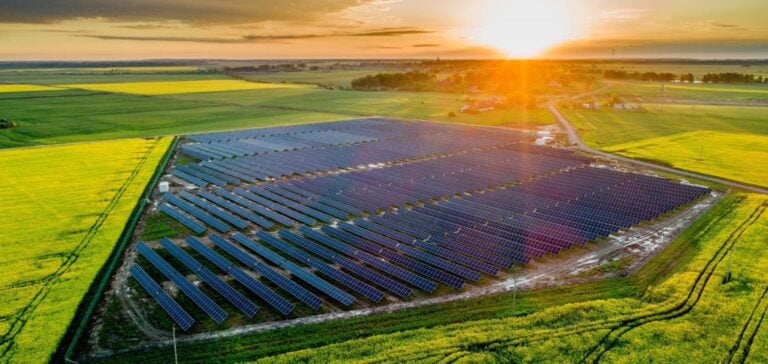Green Genius, present in eight European markets, sells its 34 MW portfolio of photovoltaic (PV) power plants in Lithuania to Nala Renewables.
This agreement represents a strategic step for Nala Renewables, a global renewable energy investment and development platform, to strengthen its presence in the Baltic region.
The acquired portfolio will generate around 96,000 MW hours of clean energy per year, covering the energy needs of 9,500 households and reducing CO2 emissions by 20,000 tonnes equivalent each year.
This transaction represents a significant step forward in the Baltic States’ energy transition.
Partnership and Strategy
Nala Renewables sees this acquisition as a strategic move to anchor its presence in the Baltic States.
Will Herlinger, Director at Nala Renewables, says: “We are delighted to have consolidated our foothold in Lithuania through the acquisition of this operational portfolio from Green Genius.
We identify the Baltic countries as a strategic region and plan to continue our expansion.
“Green Genius, recognized for its sustainable energy solutions in Europe, is delighted with this agreement.
Rokas Bancevičius, CFO of Green Genius, says: “We are delighted that Nala Renewables has chosen our projects for their entry into Lithuania. This is a testament to the quality of our renewable energy initiatives.”
Future expansion
In addition to the initial 34 MW, Nala Renewables has signed an agreement with Green Genius to acquire a further 45 MW of short-term PV projects, bringing the portfolio’s total capacity in Lithuania to 79 MW.
This extension will make a significant contribution to the development of the renewable energy sector in the region.
Tadas Balsys, Head of Mergers and Acquisitions at Green Genius, underlines the importance of this transaction: “This agreement with Nala Renewables marks a crucial milestone for Green Genius, Lithuania and the Baltic region as a whole. We are pleased to participate in the growth of the renewable energy sector by increasing PV capacity and attracting a new institutional investor.” The power purchase agreements entered into provide security of income in the medium term, reinforcing the financial viability of the portfolio.
This transaction is part of a wider trend of investment in renewable energies, underlining the growing importance of the energy transition in Europe.
Impact on the Renewable Energy Market
The acquisition by Nala Renewables strengthens Lithuania’s position as a key player in the renewable energy sector in Eastern Europe.
The collaboration between Nala Renewables and Green Genius could serve as a model for other partnerships in the region, stimulating investment and the development of clean energy infrastructures.
The growing demand for sustainable energy solutions in the Baltic States is a positive indicator for the future of the renewable energy market.
Nala Renewables’ initiative demonstrates investors’ confidence in the region’s growth potential.
Future prospects and developments
The involvement of Nala Renewables and Green Genius in this project illustrates how strategic partnerships can accelerate the energy transition.
Future acquisitions and developments in the renewable energy sector should continue to attract investment and foster sustainable growth.
Nala Renewables’ acquisition of this portfolio in Lithuania represents a significant step forward in strengthening the region’s energy infrastructure.
This development underlines the importance of international collaboration in achieving long-term energy transition goals.
Continued investment in renewable energies, supported by favorable policies and growing demand, is essential to achieving global climate goals.
The partnership between Nala Renewables and Green Genius is a perfect illustration of this dynamic.






















